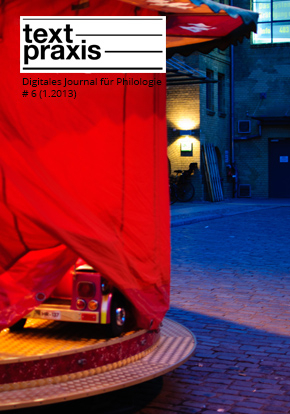Digital Journal for Philology

Textpraxis # 6 (1.2013)
In this current issue, Barbara Mariacher focuses on Elfriede Jelineks poetological concept, Falk Bornmüller examines the epistemological value of literature based on Shakespeare’s Hamlet and Goethe’s Wilhelm Meisters Lehrjahre, and Klaus-Michael Bogdal outlines the benefits of ›soft‹ theories for the humanities. In the ›debate‹ section, Klaus Oidtmann and Paul Stadelhofer analyse the economic and philosophical use of competence, based on Jürgen Gunia’s article in Textpraxis # 4.
In her article, the author deals with Elfriede Jelinek’s poetological concept, based on the example of the play Stecken, Stab und Stangl (1996). This involves a short substantive and historical introduction to the concept of language and text as well as author and work, which is taken from a theoretical perspective closely related to Roland Barthes. The center of attention is the ideology-critical potential, which is characterized by Jelinek's method, and the role of the recipient, from which an active reception position is demanded.
Both literary studies and philosophy are equally confronted with the question of how to deal with the ›knowledge medium‹ literature and how to integrate it into one’s own cognitive interest. The epistemological relationship between literature and philosophy should hereby not be understood as strictly dichotomous, and cannot be reduced to the formula propositional vs. non-propositional. Rather, an epistemological value of literature is to be assumed, which is not met by a binary approach. Based on central scenes from Shakespeare’s Hamlet and Goethe’s Wilhelm Meisters Lehrjahre, the symbolic representation and knowledge form of literature is worked out as an act of cognition, as a reproducing understanding.
In his lecture on November 21, 2012 at the University of Münster, Klaus-Michael Bogdal posits the concept of co-called ›soft‹ theories for the humanities. Whereas in the 1960s it seemed that ›hard‹ formalistic and linguistic theory models would be established in literary studies, an era of »After Theory« (Terry Eagleton) is postulated in the present. Bogdal’s approach moderates these two poles to a pragmatic theory formation, which is able to bring the modes of proving, persuading, teaching and dialoguing together.
